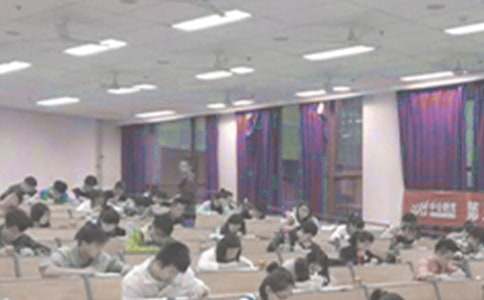初中英语第二册上 UNIT4 参考试卷
初中英语第二册上 UNIT4 参考试卷一、找出下列各组单词括号中部分读音不同的一个单词。

(1). (a)nt
A. g(oo)d B. f(oo)t C. l(oo)k D. s(oo)n
(2). (a)nt
A. m(oo)n B. r(u)ler C. s(ure) D. sh(oe)
(3). (a)nt
A. c(o)me B. m(o)ther C. l(o)ve D. h(o)me
(4). (a)nt
A. b(u)t B. p(u)t C. n(u)t D. s(u)n
(5). (a)nt
A. d(ear) B. id(ea) C. n(ear) D. p(ear)
二、请将下列短语与相应译文用线连接起来。
(1).
三、根据句子的意思,用所给词的适当形式填空。
(1). This room is much ______ (good) than that one.
(2). We are going to ______ (work) on a farm tomorrow.
(3). Where __1__ you often __2__(do) your homework?
(4). What time __1__ he __2__(go) to work every morning?
(5). Is she going play ______ (play) basketball this afternoon?
(6). Look! Li Lei ______ (swim) in the river.
(7). Why don't you ______ (come) to my house?
(8). There are a few ______ (child) in the room.
(9). We ______ (not have) any classes on Sundays.
(10). This cake is much ______ (big) than that one.
四、连词成句。
doesn't
work
a farm
on
he
going
to
do
what
you
are?
do some shopping
this afternoon
going to
they
are?
is
putting
on
a
red
coat
she
for
lunch
time
is
it
by bike
goes
to
he
work
at
six
to
leave
going
are
they
coming
is
who
your
hat
don't
on
put
box
largest
of
all
the
which
is?
五、选择填空。
(1). It's ______ colder today.(a)nt
A. more B. much C. most
(2). I have ______ apples than you.(a)nt
A. many B. more C. most
(3). Could you get ______ bananas for me?(a)nt
A. few B. some C. most
(4). He always ______ English in the morning.(a)nt
A. read B. reads C. reading
(5). She is going to ______ a meeting.(a)nt
A. has B. having C. have
(6). Don't look ______ of the window.(a)nt
A. out B. outside C. at
(7). She knows only ______ Japanese.(a)nt
A. a few B. little C. a little
(8). Let's ______ them with their work.(a)nt
A. helps B. help C. helping
(9). He is going to play ______ basketball this afternoon.(a)nt
A. / B. the C. a
(10). We are going to have ______ swim with him this afternoon.(a)nt
A. / B. a C. the
六、读下面对话,根据需要填入所缺单词。
(1). LILY: Hello, Han Meimei! Where are you going?
HAN: ___1___ ___2___ ___3___.
LILY: What are you going to buy?
HAN: ___4___ ___5___ to ___6___ some bananas.
LILY: ___7___ you ___8___ to ___9___ some for me?
HAN: Sure, But why don't you come ___10___ me?
LILY: That's a ___11___ ___12___! Let's go!
七、根据短文内容选择正确答案。
(1). Everyone knows Afanti (阿凡提) is a clever man. He can give you the right answers to your difficult (难的) questions. Here is an interesting (有趣的) story (故事) about him. Tom, a friend of Afanti, comes to let him make some clothes for him. But he says, “You can't make them into red, blue, black, green, orange or the other colors or (否则) I won't pay (付……钱) you any money.” Afanti thinks for a short time and says, “All right, but you can't come to take them on Monday, Tuesday, Wednesday, Thursday, Friday, Saturday and Sunday, or you must pay me more money.” Tom hears (听到) it and says happily, “OK! You are the most clever man in the world.” “You're not more foolish (笨) than I, and I'm not the most lever.”
1. 1. Everyone knows Afanti ______.
A. is clever and can make clothes B. isn't foolish and isn't the most clever man in the world C. is very clever and can answer all kinds of difficult questions
2. 2. One of Afanti's friends Tom comes to ______.
A. let Afanti answer his difficult questions B. asks Afanti to make him some clothes in different colors C. asks Afanti to make him some clothes and to answer some of his difficult questions
3. Afanti's answer to Tom's difficult question is ______.
A. not right B. not good C. very wonderful (精彩的)
4. 4. Tom is very ______ to hear Afanti's answer.
A. angry B. happy C. sad
八、完形填空。
(1). The students of Class Three, Grade Two __1__ (not have) __2__lessons next week. They are going to __3__ the farmers __4__ their farm work __5__the farm. The farm __6__ (be not) very far from their school. __7__ are going there by bike, __8__ on foot. They are going to meet __9__ the farm gate at eight. They are going to __10__ on the farm.
1. A. isn't going B. aren't going C. be not going D. am not going
2. A. any B. many C. some D. a few
3. A. see B. look C. watch D. help
4. A. at B. about C. with D. on
5. A. in B. on C. around D. to
6. A. be not B. am not C. is not D. are not
7. A. Some B. Many C. Any D. No
8. A. other B. others C. the other D. another
9. A. out B. at C. on D. outside
10. 10.
A. work hard B. pick apples C. plant trees D. clean houses